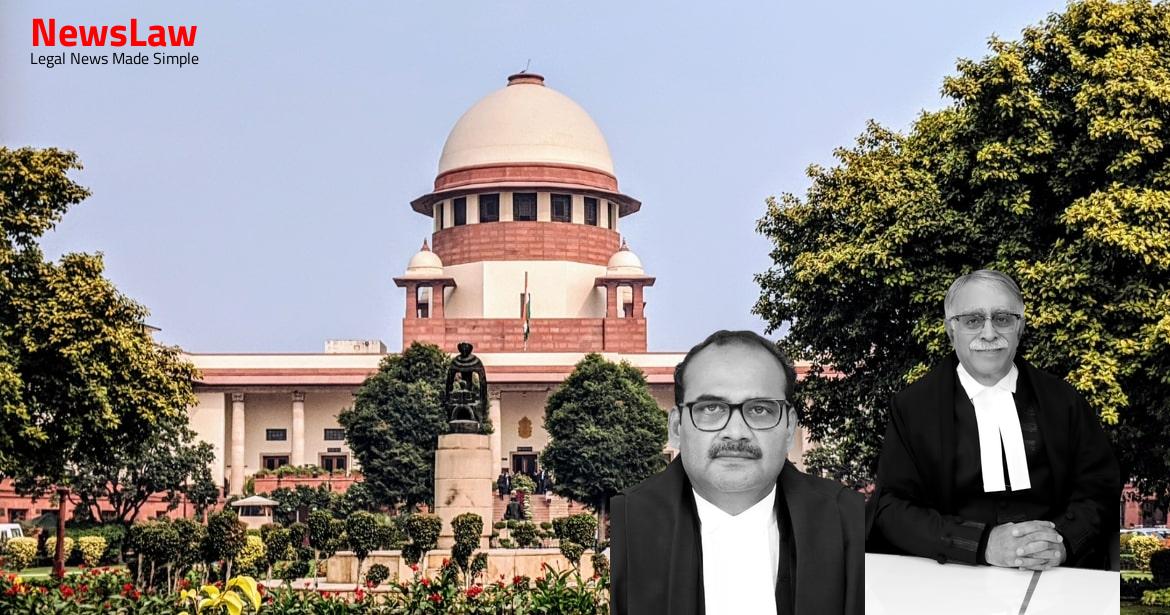In a landmark decision by the Supreme Court of India, a judgment has been pronounced in the matter of Nationality Status concerning the Appellant and the Tribunal. This case delved into crucial aspects of procedural fairness, burden of proof, and adherence to principles of natural justice. The judgment holds substantial implications for similar cases and emphasizes the importance of a thorough and just adjudication process.
Facts
- The appellant’s name was in the Voter List of the year 1997 at Sl. No.105 in Village Kashimpur, Nalbari district.
- A case was registered in the Tribunal, Nalbari in 2006, doubting his nationality.
- Appellant obtained a certificate from Gaonbura of Kashimpur Village regarding residential status in 2010.
- Notice was served upon the appellant from the Tribunal in 2011.
- Medical certificate from Civil Hospital in 2012 stated the appellant suffered from health issues.
- Appellant filed a Writ Petition before the High Court in 2012.
- High Court dismissed the Writ Petition in 2015 affirming the Tribunal’s order declaring the appellant as a foreigner.
- Appellant’s parents’ names also appeared in the Voter List of 1970, 1965, and 1985 at various addresses.
- Appellant claimed his residential history in different villages and districts of Assam.
- Appellant’s appeal against the High Court’s order is the subject matter of the current case.
Arguments
- Argument made by the petitioner that he was unfairly treated by the Tribunal as he was not given an opportunity to defend himself properly before facing serious penal consequences like detention or deportation.
- The burden of proof lies on the alleged foreigner according to Section 9 of the Act.
- The petitioner challenged the technicalities and minor discrepancies in the documents that led to his identification as a foreigner.
- The High Court’s presumption regarding the petitioner’s absence before the Tribunal was deemed erroneous.
- The petitioner’s fundamental right to be heard in such a crucial case, where he faced the risk of losing nationality and being separated from his family and deported, was highlighted.
- There was a previous direction from the court to the Tribunal to thoroughly investigate the nationality of the petitioner, which resulted in the Tribunal’s declaration of the petitioner as a foreigner deemed as unjust based on strong evidence supporting his Indian citizenship.
- The High Court found the certificate submitted by the appellant to be fake and dismissed the writ petition.
- The appellant failed to produce any documents before the Inquiry Officer and the case was referred to the Tribunal.
- The appellant appeared before the Tribunal but remained absent on subsequent dates, leading to an ex-parte order/opinion being passed against him on 19.03.2012.
- The Tribunal, after examination as directed by the Court, concluded that the appellant entered India illegally post the cut-off date of 25.03.1971.
- The appellant relied on a medical certificate from Swahid Mukunda Kakati Civil Hospital in the Writ Petition.
Also Read: Swami Satyanand vs. Swami Vedvyasanand – Legal Representative Substitution Case
Analysis
- The Court examines the initial stage of the proceedings before the Tribunal under the Act to ensure completeness of adjudication.
- Principles of natural justice are crucial and should not be excluded unless mandated by statute.
- The lack of specific grounds or material on record regarding the appellant’s nationality status poses a fatal flaw to the case.
- The term ‘main grounds’ is distinct from ‘allegation(s)’ and requires proper articulation to avoid ambiguity.
- Audi alteram partem principle necessitates a fair opportunity of being heard beyond a merely reasonable opportunity.
- Material basis or information is essential for authorities to suspect a person of being a foreigner and subsequent action under Section 9 of the Act.
- The burden of proof under Section 9 lies upon the person alleged to be a foreigner following principles of natural justice.
- Strict proof of allegations is not necessary, but the material on which the allegations are founded must be furnished.
- The Tribunal’s lack of specific material and oversight of inconsistencies in names and dates raise concerns about the validity of the proceedings.
- The discrepancies in dates and spellings should be treated as minor in nature given the variations common in official records.
- The Tribunal’s reliance on vague allegations without concrete evidence is unsustainable and violates principles of natural justice.
- The commencement of proceedings without proper material or information against the appellant is deemed a fatal error in the process.
- The need for consistency in applying the burden of proof under Section 9 is emphasized based on legal precedents.
- The Tribunal’s order and the subsequent judgment are found to be unsustainable due to lack of substantiated material.
- Sharing of collected material with the accused is imperative to ensure a fair defense and adherence to principles of natural justice.
- The Tribunal’s interpretation of ‘main grounds’ as mere allegations is criticized for deviating from legal standards.
- Failures to discharge the burden of proof under Section 9 result in adverse conclusions for the appellant despite submitted evidence.
- Escalating the burden of proof without proper material against the appellant violates principles of natural justice and fairness.
- The person required to file a declaration under sub-section 23 can have someone act on his behalf if he lacks the capacity to enter into a contract.
- Exceptions to sub-sections (2) to (6) include individuals who were citizens of India before the Citizenship (Amendment) Act, 1985, and those expelled from India under the Foreigners Act, 1946.
- Detailed procedures for serving notices to the proceedee, including serving notices at their last known address and involving adult family members if the proceedee is not found.
- The proceedee must appear before the Foreigners Tribunal for every hearing if a notice has been duly served.
- Section 9 of the Act places the burden of proving nationality on the individual in cases not falling under Section 8 of the Act.
- Changes in rules and provisions are to be considered based on the most recent version rather than past versions when interpreting the law.
- The cut-off date of 25.03.1971 is important in deciding the status of individuals who came to Assam from the specified territory.
- The Foreigners Tribunal may refuse certain requests for examination of witnesses or production of documents if deemed unnecessary.
- If the proceedee fails to provide proof of their claim or arrange for bail, they may be detained in an internment or detention center.
- The Foreigners Tribunal must dispose of cases within sixty days of receiving a reference from the competent authority.
- Final decisions and opinions of the Foreigners Tribunal are to be submitted promptly to the specified officer or authority.
- Decisions on nationality given under Section 8 of the Act are final and cannot be challenged in court, but can be revised by the Central Government.
- The burden of proof is on the accused to prove their citizenship if they claim to be an Indian national.
- Penal statutes must be strictly construed, and a higher degree of assurance is necessary to convict an accused.
- The court must uphold both parliamentary intent and individual human rights, ensuring scrupulous compliance with the law.
- Provisions imposing a reverse burden of proof must be strictly complied with to protect the rights of the accused.
- The principle of natural justice must be observed even if the statute is silent on that aspect.
- The burden of proof lies with the prosecution, and if foundational facts are not proven, the accused cannot be convicted.
- The burden on the accused to justify loss of protection must be fair and reasonable.
- Fairness of trial and maintenance of individual dignity of the accused must be prioritized by the court.
- The court must consider Articles 14 and 21 of the Constitution in rendering judgments.
- Reverse burden of proof exists in specific enactments like the NDPS Act, and only after the initial burden on prosecution is satisfied can the presumption operate.
- Tribunals/courts have the power to adopt modalities necessary to achieve natural justice and fair play, even in the absence of specific procedural laws.
- The appellant is declared an Indian citizen, not a foreigner
- The Tribunal found the appellant’s claims to be credible and not in doubt
- No need to remand the matter for further consideration
- Minor discrepancies in the material produced by the appellant
Also Read: Resolving Legal Entanglements: A Case Study of Raj Reddy Kallem vs. The State of Haryana & Anr.
Decision
- The appeal has been allowed on specific terms.
- No order has been passed regarding costs.
- The judgment will be circulated to the Tribunals under the 1964 Order by the Registrar General of the High Court.
- Necessary legal consequences will follow.
Case Title: MD. RAHIM ALI @ ABDUR RAHIM Vs. THE STATE OF ASSAM (2024 INSC 511)
Case Number: C.A. No.-007332-007332 – 2024



